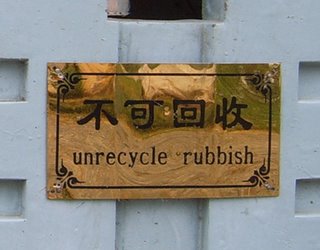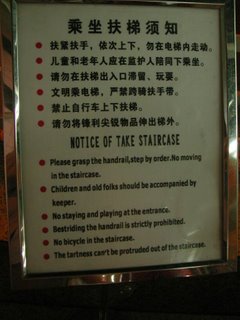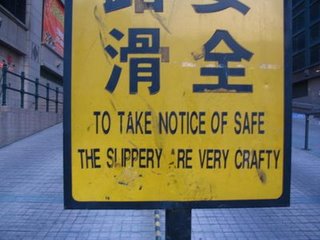| Friday, September 29, 2006 |
| Don't Stand So Close To Me |

I hope you don't mind the large graphic. I just love Sting.
Nonetheless, he has a point. And in China - Laiwu especially - it is completely overlooked. The "it" I'm referring to is personal space. The Chinese have no concept of its existence. In the States, the individual has rights, needs, and desires. Also built into our culture is the concept of each individual's "bubble" of personal space. Unless on a crowded subway or in close relations with another person, that space is not to be invaded at all costs. At the very least, we distance ourselves as much as possible, adjusting for the movement of people given the amount of extra room we have. People try to avoid each other walking down the street, and bumping into someone usually results in a harried, but apologetic, "excuse me."
Not in China.
In Beijing's tourist districts, beggars tug on your clothing. When walking down the street or waiting in line, people bump, push and shove. There isn't even an appropriate Chinese translation for the term, "excuse me." There's duibuqi, which roughly translates as I'm sorry. That usually refers to a larger transgression, but is about as close as it gets.
The thing that spurred this little rant was an invasion of privacy, somewhat innocuous, but which took me rather by surprise. As I was sitting and typing an email to a friend, a co-worker who was talking to my assistant walked right over, stood behind me, and began (trying to) read what I was typing. Not just glancing to see what I was up to, but actually staring, trying to make sense of the English on the screen. Interest in what I'm up to is one thing, but this is on a whole different playing field. I had to clench my teeth and fists to stop myself from leaping up in front of my screen and telling this co-worker a thing or two about respect for privacy.
I stopped myself because this is the way the Chinese are. It's in the way they're raised and their culture inculcated. Privacy and personal space are nothing to them because, in a country with overpopulation and no space to spare, they have no boundaries. They wouldn't understand my objection to reading over my shoulder or staring or tugging on my sleeve. Because if it doesn't bother them, why should it bother me?
I'd like to think that if increased building occurred in now underdeveloped areas - an increase in space - and there was an increase in focus on individual rights, it would it lead to a change in their behavior over time. I don't know if it's possible, let alone anytime soon. But it would certainly be nice to have some breathing room. |
posted by Rachel @ 5:17 PM   |
|
|
|
| Wednesday, September 27, 2006 |
| Those Lazy-Hazy-Crazy Days Of Summer |
I have officially been in Laiwu a week now and the one thing that has struck me more than anything else, and truly highlights the cultural differences between the United States and China, is the laid back atmosphere of Chinese business. My first notion of this was the evening before my first day of work. I asked my assistant what time I was expected to come in the next day. She said, "come in whenever you like. I can call you around ten and pick you up then, if that's not too early." Ten? I know I'm on the other side of the world, but international business is international business. I was expecting eight-thirty, or nine at the very latest. Especially as I wasn't really oriented yet. But nonetheless, I came in at ten.
After aimlessly surfing the internet for an hour or so, my assistant told me that the boss wanted to meet me face-to-face. Finally, I thought. So I got up and went to his office for jiaoliu (literally meaning interchange, referring to a kind of informal meeting). We talked a bit about my trip down to Laiwu, he checked to make sure my living situation was all set up, and we chatted about my educational background and my Chinese fluency level. Then we ended the meeting as it was already almost noon (I came in at ten, so lunchtime arrived rather quickly). Since I eat all my meals in the restaurant of the hotel I live in, I went back there to eat. I ate in a leisurely fashion, reading and occasionally taking a bite, when I looked down at my watch and realized it was one-fifteen. I figured I ought to be getting back. So I finished up, signed the check and headed back to the office. I entered the glass doors, ran up the two flights of stairs to my department, and discovered the door was locked. Maybe they're in a meeting, I wondered. So I hung around for a while outside the door. Finally, around two-fifteen, a woman whose office was down the hall came in and, upon realizing I was locked out, allowed me to sit in her office for a while. We chatted for about twenty minutes, at which point she looked down at her watch and noticing that it was two-thirty five said, "everyone should be getting back now from lunch." Two-thirty five? Again, I was puzzled. I asked her, does everyone usually come back from lunch so late? She replied, "Lunch here is two-and-a-half hours long. Sometimes people go home and nap or watch the news."
And it was then that the working environment here in Laiwu became clear to me. Laid-back might not even be the right word for it. Clearly something must be getting done, for this to be one of the world's largest steel producers. Yet the flow of workers in and out was not fluid, but lazy in its nature. And each new discovery of the workday's amorphous structure grated on the work ethic engrained in me by the American business culture. To put it bluntly, this ain't no regular nine-to-five, folks.
But it makes sense of the week before I came to Laiwu - indecisive planning, a we'll-deal-with-it-when-we-get-there kind of attitude, the inability to tell me exactly what I needed to do to get all the formalities taken care of. As of yet, I am in no position to comment on its effects on actual efficiency because I have no means of comparison. But I'm sure such an effect does indeed exist.
But there are definite upsides. In Laiwu, there seems to be more family togetherness - children and parents often eat lunch together, and the unstructured day makes coming and going easier. There is certainly no ill-will or griping about having to come in too early or about long hours. The flexibility during the day even allows for a weekly women's yoga class in the mid-afternoon (which I had my first experience with yesterday). And workers have plenty of time to come into my office and help me practice speaking Chinese.
I haven't decided for myself, as yet, whether these upsides outweigh the downsides of not having a structured workday with higher expectations and greater professionalism. This will be a question that will develop over time. And as I discover its real effects, I hope to come closer to understanding what gap lies between American and Chinese business development. |
posted by Rachel @ 3:01 PM   |
|
|
|
| Tuesday, September 26, 2006 |
| Show Me The Chinglish! |
For those of you who enjoyed the earlier Chinglish article, here are a few factoids dug up from the international marketing archive:
The Chinese translation of the famous KFC slogan, "Finger- lickin' good," was interpreted as "Eat your fingers off."
Coca Cola's first version of its Chinese name was different from the one it presently uses. Unfortunately, the company found that people interpreted its first choice as "Bite the wax tadpole" or "Female horse stuffed with wax", depending on the dialect.
Pepsi didn't fare much better with the translation of its "Come alive with the Pepsi Generation" slogan. In Taiwan, it became "Pepsi will bring your ancestors back from the dead."
Chinglish works both ways.
BTW, for those of you right now sitting at your desk, bored and surfing the internet aimlessly for something to occupy your time, click on this:http://www.thesurrealist.co.uk/slogan/slogan.cgi?word=The+Funny+Site+of+the+Day
It's hours of fun for the whole family! |
posted by Rachel @ 11:22 AM   |
|
|
|
| Monday, September 25, 2006 |
| "Should Auld Acquaintance Be Forgot..." |

I was sitting last night, eating my dinner in the hotel dining area and reading the book I bring with me to help me ignore the inavertible stares of my fellow Chinese diners when, for the first time, I noticed that the dining room had music piped in from their overhead speakers. I paused up from my reading (A History Of Warfare by John Keegan - highly recommended if you haven't read it, it's my second time around), wondering if it was some new contemporary Chinese pop, or perhaps traditional gudai Chinese music which is often played in nicer restaurants (the Chinese answer to American elevator music, except much more interesting to listen to). But as I squinted and listened more closely, I realized it was neither of those things. I was listening to Auld Lang Syne. For those of you unfamiliar with the title (but probably familiar with the song itself), it is a song commonly sung at New Years' celebrations after the clock has struck midnight. Next came, Have Yourself A Merry Little Christmas. And I wondered for a bit. This is not the first time I've come across the Chinese phenomenon of playing seasonal music from the States or Europe at the wrong time of year or playing music inappropriate for a given venue (i.e. playing rap music with explicit lyrics in a mall with kids running around). What could be the explanation for these musical choices? Two ideas popped into my head: 1) They have no clue what the songs that they're playing are and just assume that Western music is Western music; 2) They know exactly what kind of music they're playing, but so badly want to be playing Western music that they're somehow okay with playing whatever they've got, figuring that no Chinese person would recognize the song anyway. I sincerely hope it's neither and that some third explanation emerges from the woodwork. The first makes them seem ignorant, the second desperate and I know the Chinese to be neither, especially with regards to international pop culture. And yet the phenomenon exists.
I wonder if it ties into the cultural habit of mingling with and borrowing from Western culture without research (and yes, I am aware that this is a mass generalization - but if you had seen the amount of distorted Western cultural references and mistaken uses of Western terminology, figures, and ideas that I've seen, you'd say the same).
*Just as a note, I know that the post below is from the 23rd not the 25th, but I had to cut and paste it into the new website today as I have changed the address from the old site and would like to have one condensed blog instead of two. |
posted by Rachel @ 3:07 PM   |
|
|
|
|
| Ex-Pat Adrift |
Well, I've been in Laiwu almost a week now. And no less than a handful of weird goings-on have occurred. There is always the usual pointing, staring, receipt of confused looks from native Laiwu-ren. But starting work and trying to bridge the language and culture gap has proved interesting.
First, allow me to apologize for changing the link to my blog. I made the mistake of telling my colleagues here in Laiwu my other blog address, so I couldn't write about them on it. I didn't realize with what zealousness they would read it until I awoke this morning to 10 email messages that contained some very serious questions and commentary regarding what was supposed to be (at least mildly) humorous content. I appreciate their effort and energy, but remember that these are the same people who provide most of the humor in my day. And not being one to talk about others to their faces, I chose to start with a fresh blog address so that I could give my home viewers a true slice of life in Laiwu.
After a long trip here involving a cancelled plane flight and a 12-hour bus ride with about 150-pounds of luggage (pretty much everything I own), all I wanted was to rest. I arrived at 4 a.m. (China time) and slept until about 8:30 a.m., awakened by the sound of very loud yelling. I figured maybe there was a car accident, or some construction workers at the site next door to my hotel had gotten into a fight. But it was more rhythmic than that. Then I realized, the voice was shouting commands and then counting from 1 to 8. I looked out my window and several hundred people, all in blue Laigang Steel uniform, were simultaneously responding to the loudspeaker's commands, exercising in tandem. Although angry to have been woken up at such an early hour in such a way, it was quite a sight. It was like army training for the everyman. While I don't plan on partaking myself, I could see the sense of togetherness that comes from living in a small city where most people work at the same company you do. The danwei system (a unit that provides for the needs of the workers of a given company or industry) really does still exist in China in almost the same way it did before, unifying all the workers of Laiwu Steel with their blue jackets and Laigang patches.
While I admire their sense of togetherness, there are some cultural differences between the U.S. and China that I'm damn proud of. For example, on Thursday I schooled some Chinese workers in the ways of American basketball. Apparently, they didn't even expect an American girl to know the rules of basketball, let alone be able to crush them like a fat American sitting on a Chinese farmer (for those of you who have never been to China and don't get the reference, the Chinese think that all Americans are fat - which is why everyone here thinks I'm Spanish).
But by and large the most humorous of these occurrences happened just this morning as I was sitting down to start this blog. First thing when I came into work, there was a twenty-something Chinese guy sitting and chatting with the coworker I share my office with. She explained to me that his English was pretty good and that he had wanted to be introduced to me. He seemed very nice and interested in my education and religious backgrounds and we talked a bit about some of the religious differences between Judaism, Christianity, Buddhism, and Hinduism. Then my coworker casually mentioned that if I wanted to take trips to other parts of Shandong (something I had earlier expressed an interest in), that I should go with this guy together for the sake of safety. And it was at that very moment that I realized it: I'd been set up. I've been here not even a week and my colleagues were already searching around for my Chinese husband. And being in a Jewish family as I am, I should've been able to smell a set-up in the air. But I wasn't prepared for it. The young man then shyly mentioned that because of our religious backgrounds, "it was forbidden." I didn't even want to ask what exactly "it" was referring to. I just excused myself and walked away, laughing quietly as I went.
And that's just the first three days. |
posted by Rachel @ 3:01 PM   |
|
|
|
| Thursday, September 21, 2006 |
| You're Not Really In China Until You've Seen A 7-Year-Old Boy Being Chased Across A 6-Lane Highway By Goats |
And first off - yes, I did actually see that on my drive into Laiwu. There is a lot to be said for the differences between big city living and the small city life. But most of the differences are pretty easy to swallow. There's not a gym to be had, not even in the hotels. But as a pretty good substitute, you can run up and down the mountain ranges that are just steps away. There aren't any real official organizations you can join to meet people and there are no universities close by, but every night at nine there are friendly middle-aged women doing taijiquan, dancing, and chatting out by the roadside.
And if you're an American - or a foreigner from any country, for that matter - and you're in Laiwu, you're a celebrity. Apparently, I'm one of only three foreigners in all of Laiwu and the other two are black men from southern Europe. Here, I get stared at and whispered about everywhere I go. It was a bit bothersome in Beijing, but in Laiwu it happens so often it can turn a person paranoid. According to one of my colleagues, Laiwu people (especially native Laiwu people) are friendly but shy, and would rather whisper about you than approach you.
Unless they want to learn English. And then they won't stop talking until you agree to be their personal English-language sherpa. What a way to make new friends. |
posted by Rachel @ 10:09 AM   |
|
|
|
| Monday, September 18, 2006 |
| And The Red Tape Will Flow Like Wine In The Streets |

How I wish the world of business in China was as romantic as Dickens' version of revolution-era France. At least in that tale, as long as the blade was sharp enough, even the guillotine was mostly painless. It is not so, wading the murky waters of Chinese business relations.
Beginning a job in (by Chinese standards) a relatively small city in China was supposed to make for an interesting experience. I knew there would be hurdles - but they were not what I had expected. The biggest issue was not a language barrier issue (although Shandong accents are almost unbearable to listen to), nor was it a matter of background. It was a matter of one's attitude toward life; a culturally engrained mindset that I previously took for granted.
In the United States (and most of the West), in the era of Donald Trump and the "American Dream," we are taught that it is hustle, that sense of urgency and competition that pushes you to outdo your opponents, that makes you a success. And in the States today, we talk so much about Chinese modernization. With those thoughts of modernization comes the idea that if they are modernizing, they must be becoming more like the modern nations. But some mentalities are here to stay. In China, things are done when they get done. Little details are to be saved for another day. Impressions are only important when they're made public. Human resources and public relations are like the appendices of business (the body part, not the section of a book).
I know some of you might be thinking, "But look at their success! It can't be that bad." Well to that I say two things: First, a good number of companies here are foreign-owned or have foreign board members and are therefore based on Western business models. But second, and more importantly, business-hub cities like Beijing and Shanghai hold only a portion of businesses in China - especially when you only consider organically Chinese businesses and exclude foreign-owned/foreign-run enterprises. While Beijing and Shanghai companies may have their act together, a good number of companies in other smaller cities do not. These are the pitfalls of the Chinese lacking a historical international business base. While I wish that I could single-handedly reform the whole of these businesses, it is indeed no small task. But over the next six months, I will be digging my teeth into the steel giant that is the Laigang Group and I can only hope I don't come out with a mouthful of air.
P.S. Extra kudos from me to those of you who speak French and get the cartoon :) |
posted by Rachel @ 11:01 PM   |
|
|
|
| Sunday, September 17, 2006 |
| Live Long and Emigrate |
| Did you know that people living Baltimore City, MD have one of the shortest life expectancies in the United States? And that Asian women's life expectancies are higher than white women's by almost 13%? Glad I moved to China. Now, on to step two: actually become Chinese and achieve my dreams of immortality. Well, relatively speaking. Hey, I'll live longer than YOU... |
posted by Rachel @ 5:04 PM   |
|
|
|
| Friday, September 15, 2006 |
| Don't Judge A Book By Its Cover, Judge It By Its Title |
| I just wanted to quickly thank Piao Zhongren for my blog's new title. Even if you can't make it to China, at least your ideas can. |
posted by Rachel @ 9:46 PM   |
|
|
|
|
| International Protectionism: A Trojan Of A Different Color |

We've all heard the ruckus emerging from the arguments over protected industries. Economists say that governments that block fair competition cause international catfights in the WTO - fights which subsequently spill over into other arenas like politics or human rights issues. Additionally, protection of industries throws the international economic equilibrium into disarray. To talk about these ideas is lofty indeed, but when do we really get to see concrete evidence of these economic concepts in motion?
I'll tell you when.
When we're watching Pokémon. That's when.
What does Pokémon have to do with the fight over fair trade, you may ask. Well, I was reading some Beijing newspapers this morning and came across a rather interesting article. According to the Beijing City News,"(translation) China has banished foreign cartoons such as The Simpsons, Pokémon and Mickey Mouse from primetime television in an attempt to protect China's struggling animation studios." After finding the article to be fascinating and dedicating my morning to researching similar stories, I decided it was either a decidedly poignant issue or so trivial that I should vow to find new hobbies. Hoping that my life is not that sad, I chose to believe the former over the latter.
I spent a lot of time during my college years learning why protectionism is bad. Now I can actually see the reason. Why should the Chinese people suffer under these protectionist policies? Why should they be restricted in this way? They're losing so much. Forget freedom of speech. Forget human rights. They're losing Mickey Mouse. And if you've never been to China, you have no idea how much the Chinese people love that darn cartoon mouse. We have to stand up against censorship. They can take our liberty, but they can't take our Mickey Mouse. Wait, that's not right...
The coup de grace of the whole article, however, is this statement: "(translation) Chinese animators produce hundreds of hours of programming a year but are not known for flair or originality." Wow. That's like a slap in the face. I hope these Chinese animators all gather tomorrow to lynch the news journalists who wrote these articles.
And then there would finally be interesting news to write about. |
posted by Rachel @ 8:48 PM   |
|
|
|
| Sunday, September 10, 2006 |
| Lost In Translation |

I was reading the Beijing newspaper today and saw this headline:
(roughly translated) For the 2008 Olympiad: Beijing pitches in to clean up Chinglish.
Anyone who has ever been to Beijing, or any part of China for that matter, has seen any number of incorrectly translated English signs. The article continued (translated), "Campaign organizers have asked residents to look out for erroneous English signage in their local areas and send in examples."
Well, for those of you who have never been to China, and to do my part for the Beijing Olympic Organizing Committee:



For those of you who can't read it, that last line says, "The tartness can't be protruded out of the staircase."
So great.



Hey kids, learning Chinglish is fun! |
posted by Rachel @ 9:09 PM   |
|
|
|
| Saturday, September 09, 2006 |
| The Journey Begins...in a week and a half |
After having been in Beijing for almost five full weeks I have learned two very important things:
1) Large Chinese cities are way overcrowded, far too noisy, have too many vehicles with too low emissions standards (leaving no breathable air), and are chock full of annoying Chinese merchants who will do nothing short of tugging on your clothing to get you to buy their trademark infringing merchandise; and
2) In China, it's better to be in a large city than anywhere else.
While I have very limited experience being "anywhere else," I will be throwing myself into that life very soon. I have been studying and practicing Chinese in Beijing to prepare for working life in "The City Of No Foreigners And No English," a.k.a. Laiwu, Shandong. Seeing as I will be there for at least six months, I figured I should get a jump on all the sites in Laiwu and get a sense of what it is that the people who live there or visit there do. I figured I would do a search on Google, typing in "things to do in Laiwu Shandong." This is what came up:
Falun Dafa Clearwisdom.net (illegal religious practices...check)
FalunInfo.Net (more illegal religious practices...check)
Exporters of Garlic (they don't even grow garlic in Laiwu...but I'll give it a check anyway)
"Ms. Zhang Fuxiang Almost Tortured To Death In Shandong Province" (torture of a Falun Gong follower for illegal religious practices...check)
"A Blind Man and an Elephant" (I was interested to find out that this was actually NOT the beginning of a really good Chinese joke...)
And lastly, "610 Crimes" (disappointingly, not a list of 610 crimes committed recently in the area, but a list of the people who work in the regional code 610 provincial crime office...VERY anticlimactic)
However, a search on Laiwu using Chinese Google and talking with my Chinese tutor about the area proved much more useful. It turns out that Laiwu is in a very pretty part of Shandong Province with beautiful weather, gorgeous scenery (which also means MUCH cleaner than Beijing), and is surrounded by cities that are not too far away (= easy, cheap weekend trips) with lots of things to do. This six months is going to be my post-graduation sabbatical - with plenty of embarassing language/cultural barrier moments on the way - so stay tuned and
Welcome. |
posted by Rachel @ 11:01 AM   |
|
|
|
|
BRAND NEW:
SIGN MY GUESTBOOK!
THE WILD WILD EAST:
Everything you never knew you didn't know about life on the other side. |
| In China, the people are represented by two separate, yet equally important groups. The Chinese, who call this land "home," and the expats who migrate here. My name is Rachel. I am an expat. These are my stories. |
| What You May Have Missed |
|
| Archives |
|
|
| A Brief Disclaimer: |
| This is a satirical site intended for the entertainment of an online audience. None of the features on this site are real (except in my own distorted view of reality), nor are they intended to harm the subjects mentioned. This site uses fictional names in all its stories, except in cases when public figures are being satirized or when I choose to use this site as a platform for someone's public humiliation (usually my own). Any other use of real names is accidental and coincidental (or purposeful, but with good reason).
|
| Welcome! |
Despite the trivial nature of my random daily (sometimes weekly) musings, I hope you enjoy your stay at my site. If there is anything you need, don't hesitate to ring up the concierge, because I just travel in style like that. Have a pleasant stay and I hope that you will come see us again soon! |
| Links |
|
|
| Thanks To |



China Findouter
Ferienhaus Kroatien
Personal Statement Of Purpose
|
|

